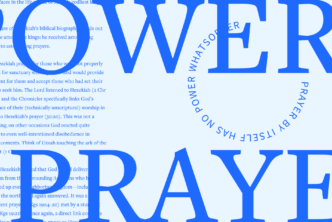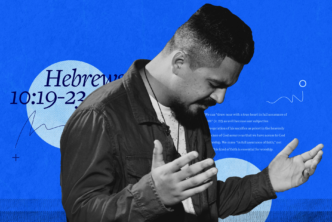Have you ever known anyone with a one-track mind? An obsession? A laser-focus on their goal? Such a man was English Reformer William Tyndale. Like the apostle Paul who said, “This one thing I do,” Tyndale was marked by a single-minded dedication. C. S. Lewis wrote that Tyndale’s “message is always the same,” like a man in war “sending the same message often” in hopes that it will get through (English Literature in the Sixteenth Century, 182). Tyndale was a broken record and could not shut up about his life’s passion: a vernacular Bible for the masses in England.
The Preparation of Tyndale’s One-Track Mind
Born around 1494 in Gloucestershire, William Tyndale studied in England at Oxford, earning a B.A. in 1512 and an M.A. in 1515. He then went to Cambridge, where he was influenced by Dutch humanist and linguist Desiderius Erasmus, who helped make the Greek New Testament widely accessible via print in 1516. Tyndale’s linguistic acumen was evident in his fluency in seven languages. His academic training prepared his mind for his future passion.
While Tyndale’s studies prepared his mind, the gospel evidently prepared his heart. He likely met with others in the White Horse Inn, where his heart was likely shaped by the gospel in the discussions of the Bible and Reformation theology. While we do not have specific documentation for Tyndale’s conversion to Christ, at some point he came to faith and developed the desire to spread the gospel among his native people by giving them the Bible in their language.
The Focus of Tyndale’s One-Track Mind
In Tyndale’s day, both church and state outlawed the publication or possession of any portion of Scripture in English. In the late 14th century, John Wycliffe and his followers had translated the Bible from Latin to English, but the following decades saw prohibition rather than adoption of an English Bible. One produced, owned, or taught the Bible in the vernacular of England at one’s own peril. Punishments up to the death penalty were carried out for such crimes. Without a legal English Bible, the common person could not be expected to read the Bible, but even the clergy could not be counted upon to know and teach it faithfully even from the official church Latin. Tyndale quickly developed and articulated his life’s passion: to make the Scriptures known to even the least in England.
Tyndale’s academic training led to a job tutoring a wealthy family, the Walshes, who enjoyed hosting visitors. On one occasion in the early 1520s, the table guests discussed the vernacular translation of the Bible. John Foxe records the comments of a priest, that “We were better to be without God’s law than the pope’s.” Tyndale could not be silent. He replied with vigor: “I defy the pope and all his laws, and if God spare my life ere many years, I shall cause the boy that driveth the plough to know more of the Scriptures than thou dost.” His one-track mind became focused on translating the Bible into English and using the technology of the printing press to distribute the Word of God to the masses.
The Work of Tyndale’s One-Track Mind
Tyndale’s passion moved him to action. There was a loophole for English translations, provided one received official church authorization, which he sought in 1524 from Cuthbert Tunstall, bishop of London. Erasmus had supported the concept of vernacular translations, and since he had influenced Tunstall, the bishop seemed like a good candidate for a supporting Tyndale’s ambition. Despite Tyndale’s ability, Tunstall refused to approve an English New Testament. Such work was not welcome in England. But Tyndale had other options.
Germany proved to be fertile ground for publishing an English Bible. Tyndale found suitable locations for his translation work and printers with resources and willingness to bring his project to fruition. But his work was not without obstacles and detours.
His first complete New Testament was delayed due to a raid on the print shop. After it was printed in Worms in 1526 and began appearing in England, Bishop Tunstall bought copies and had them burned in 1527. His purchase, however, helped finance a revision. Tyndale managed to learn the Hebrew language and also began an Old Testament translation. Despite losing two years of work in a shipwreck in 1529, he persevered and, to our knowledge, only completed Genesis through 2 Chronicles, plus Jonah.
Throughout his labors, Tyndale lived as a fugitive. In 1531, King Henry VIII sent Stephen Vaughan to persuade Tyndale to return to England. Vaughan wrote of the fugitive, “I find him always singing one note.” Tyndale would only return on the condition that the king authorize someone to produce an English Bible. Tyndale remained away from his homeland and was eventually befriended and betrayed in 1535 by Henry Phillips, a desperate man hired by the English church to sniff out the dangerous man with a one-track mind.
Phillips’ betrayal led to imprisonment, from which we have the only surviving handwriting of Tyndale. In it, the single-minded prisoner requested items such as clothing and a lamp but more than anything desired a Hebrew Bible, Hebrew grammar, and a Hebrew lexicon so that he could continue his work of translation. In this instance, Tyndale again paralleled the apostle Paul in his final imprisonment, when the great missionary desired clothing and books, but especially the parchments (2 Tim 4:13).
Tyndale’s labors ended on October 6, 1536, when he was taken from Vilvorde Castle near Antwerp, Belgium, to be executed. He was defrocked as a priest, choked to death, and burned. His last recorded words were “Lord, open the king of England’s eyes!”
The Legacy of Tyndale’s One-Track Mind
Once Tyndale became fixated on producing an English Bible, that passion marked him till his death. But his dream did not die. Within three years, his final prayer was answered, when the crown commissioned Tyndale’s associate, Miles Coverdale, to produce the first authorized English Bible. For the first time, Old and New Testaments were legally available to the English people. A steady stream of English Bibles appeared in the following decades, with Tyndale as their backbone, particularly for the New Testament. The famous 1611 Authorized Version, or King James Version, retained between 80-90 percent of Tyndale’s wording for the New Testament. Tyndale shaped the English language with an influence felt today, including in the flood of modern English Bible translations. Here is a sampling:
- “Let there be light, and there was light.” (Gen. 1:1)
- “Am I my brother’s keeper?” (Gen. 4:9)
- “Ye are the salt of the earth.” (Matt. 5:13)
- “Ask, and it shall be given you; seek, and ye shall find; knock, and it shall be opened unto you.” (Matt. 7:7)
- “Now abideth faith, hope, and love, even these three: but the chief of these is love.” (1 Cor. 13:13)
- “Looking unto Jesus, the author and finisher of our faith…” (Heb. 12:2)
- “And God shall wipe away all tears from their eyes.” (Rev. 7:17, 21:4)
Tyndale’s legacy continues beyond the actual verbiage in our English Bibles. It lives on when we read and share the Bible. It lives on when we diligently study the biblical languages and target languages to be able to better communicate Scripture in the vernacular with accuracy. It lives on when we produce technology to help spread the Word. It lives on when we provide assistance to those who are multiplying access to the Word.
In his note “To the Reader” in his 1526 New Testament, Tyndale wrote,
Give diligence dear reader (I exhort thee) that thou come with a pure mind and as the Scripture saith with a single eye unto words of help and eternal life: by the which (if we repent and believe them) we are born anew, created afresh, and enjoy the fruits of the love of Christ.
May God grant that we have this one-track mind, and make full use of the wonderful intersection of godly passion, learning, and technology to know and make His truth known.
The Reformation didn’t start with Luther
Since A.D. 300, scholars, scribes, and translators have been striving to make Scripture more accessible. Explore this illuminating timeline to discover how the preservation and publication of Scripture made the Reformation possible.
Explore the hidden history of the Reformation now.





